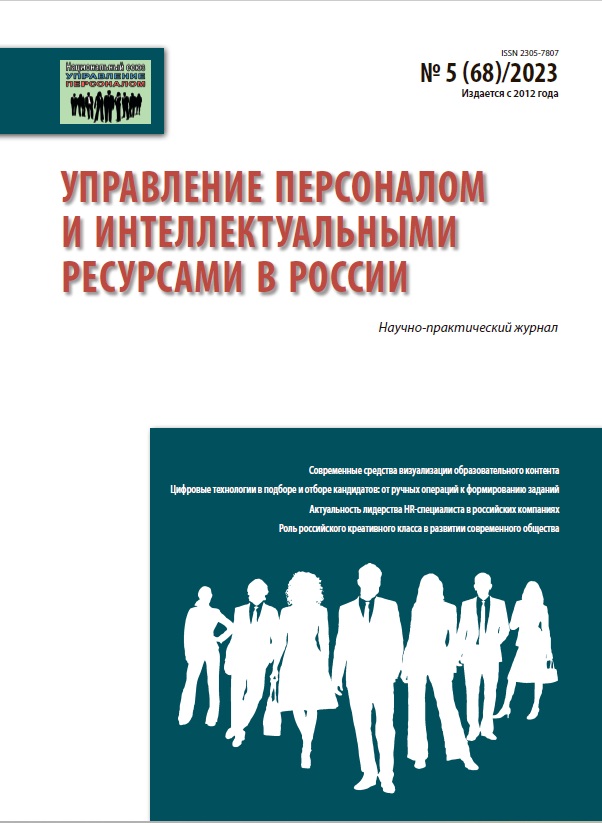The article is devoted to the study of the causes of the emergence of the creative class in a post-industrial society. The place and role that it plays in modern society is considered. The importance of the creative class lies in the fact that the growth of its number and the expansion of its influence on society leads to the fact that the introduction of scientific and technological progress in public production is happening at a faster pace. The purpose of the research presented in the article is to study the features of the creative class in the conditions of modern Russian society. The scientific novelty of the research consists in substantiating the relationship between the emergence of a creative class and the formation and development of a post-industrial society. New requirements are being imposed on employees of post-industrial society, the main of which are creativity. An objective need to activate and encourage a person’s creative abilities is being formed in society. The practical value of the research consists in the formation of prerequisites for the development of methods and technologies for motivating representatives of the Russian creative class, taking into account its characteristics and behavioral styles.
creative class, post-industrial society, knowledge society, creativity, meritocracy
1. Bell D. Notes on the Post-Industrial Society // The Public Interest. 1967. No 7. P. 102.
2. Babayan K.B. The Changing Role of Human Resources in Organizations and HRM Trends in the Digital Age. Upravlenie personalom i intellektual'nymi resursami v Rossii [Human resources and intellectual resources management in Russia],2022, no 4, pp. 5-9 (in Russian). DOI: https://doi.org/10.12737/2305-7807-2022-11-4-5-9; EDN: https://elibrary.ru/BFUKDD
3. Volkov Yu.G., Barbashin M.Yu., Barkov F.A., Kramarova E.N., Serikov A.V.,Hachecukov Z.M. Stanovlenie social'noj identichnosti kreativnogo klassa v sovremennoj Rossii [The Formation of the Social Identity of the Creative Class in Modern Russia]. Rostov-on-Don, Publishing house "MART",2013.pp 210. EDN: https://elibrary.ru/VQQLCD
4. Gimpel'son V. E. Pochemu s soroka let zarplata nachinaet snizhat'sya [Why do salaries start dropping at age 40?] Available at: https://rg.ru/2021/05/06/pochemu-s-soroka-let-zarplata-nachinaet-snizhatsia.html (accessed 30 July 2022).
5. Inozemcev V.L. Sovremennoe postindustrial'noe obshchestvo: priroda, protivorechiya, perspektivy [Modern post-industrial society: nature, contradictions, prospects]. Moscow, «Logos», 2000. 281 p.
6. Inozemcev. V. L. "Class of intellectuals" in post-industrial society . Socis [Socis],2000, no 6, pp 25. (in Russian)
7. Polutin S.V., Sedletsky A.V. Preconditions for the Formation of Innovative Behavior in Modern Society: Regional Aspect. Regionologiya [Regionology],2015, no 2(91),pp 127-136. (in Russian) EDN: https://elibrary.ru/UCMESX
8. Ryabkova S.A. Class Transformation in Post-Industrial Society: Causes and Consequences. NK [NK ], 2016, no 4. EDN: https://elibrary.ru/WWHYUT
9. Sobolevskaya A.A., Popov A.K. Postindustrial'naya revolyuciya v sfere truda [Post-industrial revolution in the world of work]. Moscow, IMEMO RAN,2009.205 p. EDN: https://elibrary.ru/QTKOCX
10. Florida R. Kreativnyj klass: lyudi, kotorye menyayut budushchee [Creative class: people who change the future]. Moscow, Publishing house "Classic-XXI",2005. 84-100 p.
11. Shchanina E.V., Sedletsky A.V. New requirements for human resources in the information society. Upravlenie personalom i intellektual'nymi resursami v Rossii [Human resources and intellectual resources management in Russia],2022, no 4, pp. 70-73. (in Russian) DOI: https://doi.org/10.12737/2305-7807-2022-11-4-70-73; EDN: https://elibrary.ru/VCSIFW






